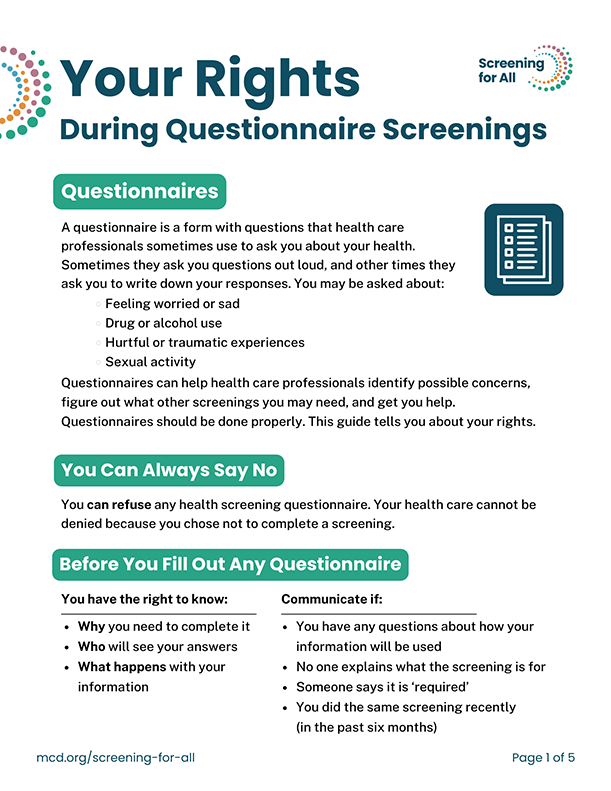Your Rights During Questionnaire Screenings
Questionnaires
A questionnaire is a form with questions that health care professionals sometimes use to ask you about your health. Sometimes they ask you questions out loud, and other times they ask you to write down your answers. They may ask you about:
- Feeling worried or sad,
- Using drugs or alcohol,
- Someone hurting you, and
- Sexual activity.
Questionnaires can help health care professionals find problems, figure out what other screenings you may need, and find help for you, but questionnaires can also be harmful if not done right. This guide tells you about your rights.
You Can Always Say No
You can refuse any health screening questionnaire. Your health care cannot be denied because you chose not to complete a screening.
Before You Fill Out Any Questionnaire
- Why Why you need to complete it,
- Who will see your answers, and
- What happens with your information.
Communicate If:
- You have any questions about how your information will be used.
- No one explains what the screening is for.
- Someone says it is ‘required.’
- You did the same screening recently (in the past six months).
What You Can Do
| If You're Thinking ... | You Can Communicate |
|---|---|
| "I've taken this screening many times." | "I did this screening recently, so why do I need to do it again?" |
| “I’m already seeing a therapist/getting treatment/getting support.” | “I decline the questionnaire because I am already receiving support for this from a [therapist/counselor/advocate].” |
| "My doctor never looks at or talks about the results." | Before a screening: "After I’m done, can we talk about what the results mean and what support is available?" For a past screening: "I want to talk about my past screening results. What did they show and what was done because of them?" |
| "I'm worried about being judged." | Remember: Health care professionals must keep your information private. Honest answers help them give you better care. |
| "I'm afraid I will get in trouble." | Ask first: "Before I answer questions about [drugs/abuse], can you tell me what information you have to report and what stays private?" Know: "Before I answer questions about [drugs/abuse], can you tell me what information you have to report and what stays private?" |
| "These questions are hard for me due to trauma." | "Some of these questions are difficult for me. I would feel better if I could [option].
|
| “I have decided I do not want to do this screening.” | "I have decided not to complete this screening today." |
| “I cannot complete this questionnaire.” | "I need support to complete this. What accommodations are available?" Accommodation examples:
|
When Information Stays Private and When it Would Be Reported
Your health information is private. This means no one can tell other people what you say or what is in your medical records unless it helps with your care, like referring you to a therapist. You must give permission before anyone shares your information.
Sometimes, health care professionals must share information by law, like when someone might get seriously hurt. If someone needs to share your information, they should tell you why.
You have the right to know what might be reported before you answer questions.
What Information Should Be Kept Private:
- Past or current drug use.
- Mental health symptoms and history.
- Most personal health information.
- Sexual activity.
Important: Legal reporting requirements for health care professionals vary by state. Health care professionals should explain what they must report BEFORE asking sensitive questions. You can always ask what information must be reported.
When Health Care Professionals Do Not Respect Your Rights
- Document what happened (e.g., date, time, staff names, location).
- If you feel comfortable doing so, ask to speak with a supervisor or patient advocate during the visit, or contact patient relations at the health care facility after the visit.
- Know your resources: Find your state or territory’s protection and advocacy or client assistance program agency and selecting your state or territory.
- AIf you feel that you have been discriminated against (i.e., treated unfairly due to your disability), you can file an Americans with Disabilities Act (ADA) complaint.
Your Rights Summary
- You can refuse any screening questionnaire.
- You can ask questions before deciding to do the questionnaire.
- You can request accommodations for your disability (e.g., alternative format, assistance completing the questionnaire, more time, a quiet room, bring someone with you, etc.).
- You should get explanations about purpose and results.
- You should know what is private and what might be reported.
- You can stop a screening at any time for any reason.
Remember
- Your health care, your choice. You decide what information to share.
- Past negative experiences are valid. It’s okay to be cautious.
- Good health care professionals will respect your questions and work with you.
- You deserve care that considers your whole person, not just screening results.
